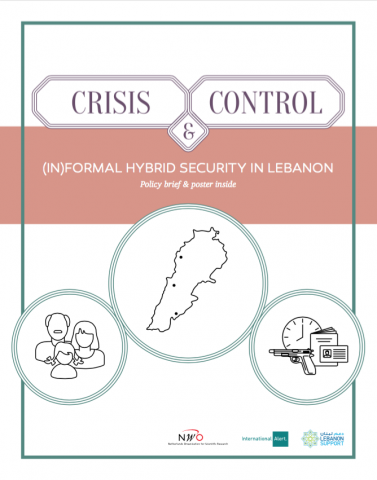Crisis & Control, (In)Formal Hybrid Security in Lebanon

This report aims to analyse how formal and informal security providers implement their respective social order agendas through a security “assemblage”. It also aims to inform the debate on refugee protection and security provision in urban settings, in the context of Lebanon’s hybrid security system. The accounts collected illustrate how state security institutions tacitly accept – or even rely on – informal security actors, managing at times to achieve their political and strategic goals through decentralised and/or illegal forms of control. In this vein, local municipalities imposed curfews and street patrols, which, far from being an institutional measure, follow a flexible and unpredictable pattern.
Three localities have been selected for the purpose of this research - namely Aley in Mount Lebanon, Ebrine in North Lebanon, and Shebaa in South Lebanon. The choice of these localities was driven by their different political and social history, their demographic homogeneity or diversity, and their relationship with surrounding regions.
This report was developed within the framework of the Lebanon Support project – “Urban refugee protection in Lebanon’s hybrid security system: a research and action agenda” – in partnership with International Alert and with the support of WOTRO-NWO. Lebanon Support's info-graphic (In)Formal Hybrid Security in Selected Areas in Lebanon is based on this report, so is the policy brief by International Alert Security That Protects: Informing Policy on Local Security Provision in Lebanese Communities Hosting Syrian Refugees.
يهدف هذا النقرير إلى تحليل كيف يطبق مزودو الأمن الرسميون وغير الرسميون جداول أعمالهم للنظام الإجتماعي، كل حسب اختصاصه، من خلال "تجمع أمني". كما يهـدف أيضـًا إلى إثراء النقاش حول حماية اللاجئين وتوفير الأمن في سياقات مدنية، ضمن نظام لبنان الأمني الخليط. وتبين القصص التي تم جمعها كيف أن مؤسسات الدولة الأمنية تقبل ضمنيا - أو حتى تعتمد على - الجهات الأمنية الفاعلة غير الرسمية، متمكنة أحيانا من نحقيق أهدافها السياسية والإستراتيجية من خلال أشكال لا مركزية و/أو غير شرعية من المراقبة. في هذا الإطار، فرضت البلديات المحلية تعميمات حظر تجول ودوريات، وهذه بعيدا عن كونها إجراء مؤسساتيا، تتبع نمطا مرنا وغير متوقع.
تمّ إجراء العمل الميداني في ثلاثة مواقع مختارة وهي عبرين في شمال لبنان، وشبعا في جنوب لبنان، وعاليه في جبل لبنان – بسبب تاريخها السياسيّ والإجتماعي المختلف، كما بسبب خصائصها الديموغرافيّة وتنوعها وعلاقتها مع المناطق المجاورة.
أعد هذا التقرير ضمن إطار مشروع مركز دعم لبنان "حماية اللاجئين الحضريين ضمن نظام الأمن الخليط في لبنان: بحث وجدول أعمال"، بالشراكة مع منظمة "إنترناشونال آليرت". وتم تطوير الرسم البياني "الأنظمة الأمنية الخليطة غير الرسمية في مناطق مختارة في لبنان"، بالإضافة إلى المزجز للسياسات "الأمن الذي يحمي: وضع سياسات حول توفير الأمن المحلي في المجتمعات المحلية التي تستضيف لاجئين سوريين".

